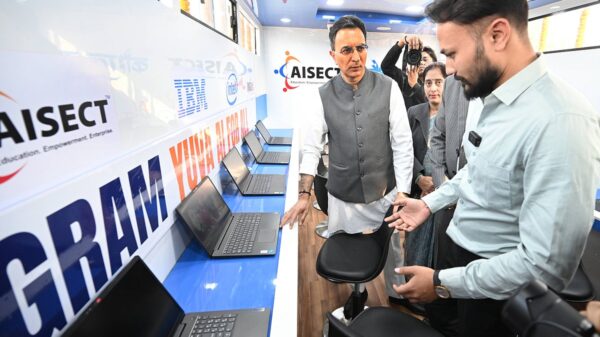New Delhi: Marketing, customer experience, and customer service are emerging as the forefront of India’s generative AI initiatives. Brands are leveraging this technology to drive growth, enhance personalization, and achieve measurable improvements in conversion rates, according to a new report from EY and the Confederation of Indian Industry (CII) on AI adoption.
The report, titled “Is India ready for Agentic AI? The AIdea of India: Outlook 2026,” is based on an EY India C-suite GenAI survey involving over 200 enterprise leaders. It reveals that a significant 76% of Indian business leaders believe generative AI (GenAI) will have a notable impact on their operations, with nearly half of the organizations surveyed already implementing multiple AI use cases in production.
Despite this enthusiasm, the study indicates that over 95% of organizations allocate less than 20% of their IT budgets to AI, with only 4% exceeding this threshold. This disparity illustrates a gap between high conviction in AI’s potential and the commitment required for scaled transformation, a key factor influencing how quickly enterprises can realize returns from their AI investments.
Focus on Customer-Facing Functions
Customer-centric functions are at the core of this AI deployment trend. The report highlights that customer service and marketing remain top priorities for AI interventions, although functions like operations and supply chain are quickly catching up. Fresh survey data indicates that operations, customer experience, and cost reduction are set to be the primary focus areas for GenAI and Agentic AI use cases in the coming year.
Other functions, including R&D, supply chain, and risk analytics, are also seeing increased AI integration, with more than a quarter of respondents planning to incorporate AI into these areas. The emphasis is shifting from pilot projects to scalable use cases that directly impact revenue and customer metrics. The report positions GenAI as a catalyst for marketing-led growth, enabling personalized customer interactions that enhance engagement and conversions. Meanwhile, Agentic AI paves the way for new business models, such as AI-assisted commerce and AI-native customer experiences.
Success Stories in AI Implementation
Several case studies within the report illustrate how Indian companies are embedding GenAI into their sales and marketing processes. For instance, Axis Bank has deployed GenAI-powered assistants across its employee and branch network, achieving a remarkable 30% increase in product conversions for term deposits, mutual funds, and credit cards, along with a 10-point boost in its Net Promoter Score (NPS).
State Bank of India (SBI) has taken a dual approach by utilizing Agentic AI for customer service and GenAI assistants for employee support. This strategy has resulted in reduced average handle time and improved first-contact resolution—critical metrics for both service quality and sales opportunities within its extensive network of over 22,500 branches.
In the fast-moving consumer goods sector, Hindustan Unilever (HUL) has integrated GenAI into its retail marketing operations, generating over 100,000 ads at effectively zero marginal cost while processing approximately 25 million shelf images monthly. Such initiatives enhance sales execution and on-shelf visibility, transforming AI into a major growth driver.
Telecom giants are also harnessing AI to reshape customer experiences. For example, Reliance Jio employs Agentic AI for real-time network optimization and customer management, leading to improved network uptime and reduced call center load. Meanwhile, Bharti Airtel uses network-level AI to block spam calls and SMS, intercepting over 26 billion calls and mitigating churn risks.
AI as a Revenue Driver
While cost savings and productivity remain important, the report emphasizes a growing perception among Indian enterprises that AI is a crucial driver of top-line growth. The findings suggest that both GenAI and Agentic AI facilitate personalized experiences and new service models, extending beyond mere efficiencies to create entirely new revenue streams.
The survey also captured insights into how AI is reshaping marketing and customer operations. Approximately 64% of respondents noted that AI is causing selective displacement in outsourced and standardized roles like customer success and tele-calling, rather than leading to widespread internal layoffs. This reflects a shift in how tasks are organized along the marketing value chain, with routine tasks being automated while internal teams focus on strategy and creative problem-solving.
Despite optimism surrounding AI’s potential, the report underscores significant challenges marketers and CIOs face in execution. Integration and data readiness emerged as the largest barriers to scaling GenAI, with 78% of respondents citing difficulties connecting AI solutions to core platforms and issues with data quality. Additionally, measuring ROI, along with data governance and security, ranked high on the list of concerns.
In summary, the EY–CII study concludes that Indian businesses have transitioned from merely experimenting with AI to focusing on marketing, customer service, and experience as pivotal areas for demonstrating business value. The next few years will likely emphasize not just the deployment of AI models, but their effective integration into revenue, brand, and customer metrics across organizations.
See also Alembic Secures $145 Million in Series B Funding Led by Prysm Capital and Accenture
Alembic Secures $145 Million in Series B Funding Led by Prysm Capital and Accenture Consensus Launches AI-Powered Marketing Platform to Boost Lead Conversion by 6-8x
Consensus Launches AI-Powered Marketing Platform to Boost Lead Conversion by 6-8x Gartner: 95% of Marketers See Little Value from AI Agents Amid Industry Shift
Gartner: 95% of Marketers See Little Value from AI Agents Amid Industry Shift PubMatic Reports $68M Q3 Revenue, Credits AI Partnership with Nvidia for Growth
PubMatic Reports $68M Q3 Revenue, Credits AI Partnership with Nvidia for Growth Rock Salt Marketing Launches AI SEO Service to Enhance Firearm Brand Visibility
Rock Salt Marketing Launches AI SEO Service to Enhance Firearm Brand Visibility






































































